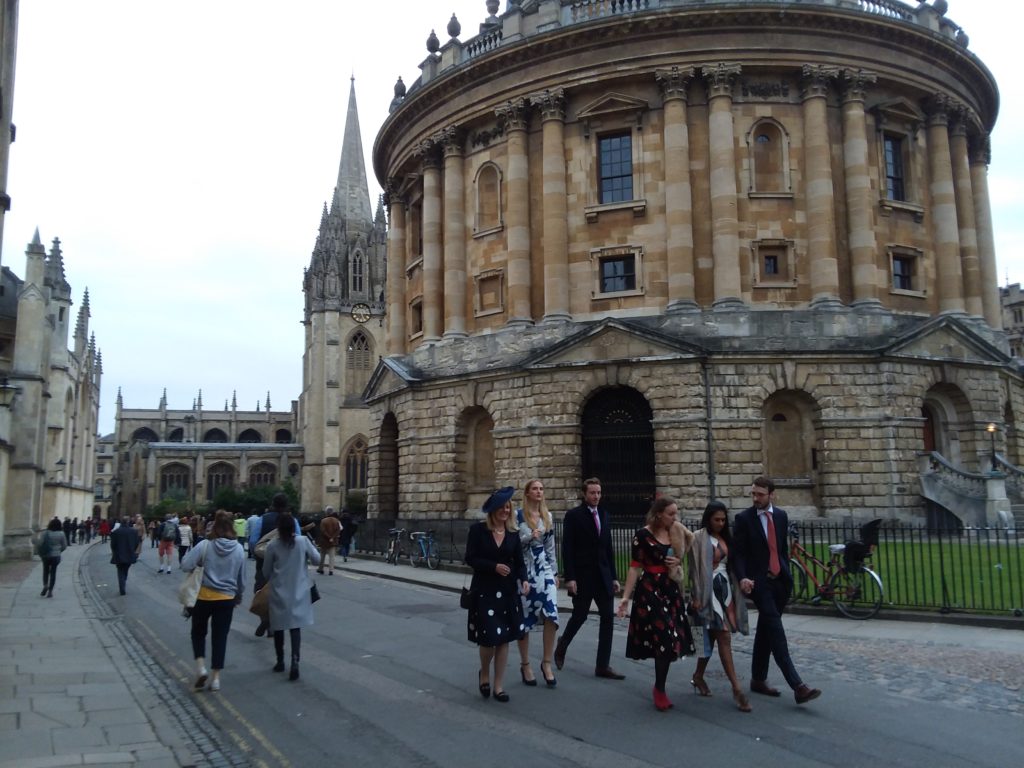
I’m now halfway through Michaelmas term (that’s Fall semester to Americans, and Autumn term to almost everyone else in the UK) so I’ve been able to settle into a routine here at Oxford. I’ve been having a whale of a time cycling backwards and forwards across town, while my experience with the university has been wonderful, but also quite obscene.
Most of my academic life these days is spent in the Andrew Wiles building — an ultra modern mathematics facility that is just over five years old now. There is a chapel right outside the main entrance however, so you won’t be forgetting where you are in a hurry. Then for lunch I head over to Magdalen College to eat at high table with the other fellows.
The college is more in line with what you might expect from watching Inspector Morse or Harry Potter. Describing it as a 19th Century Gentleman’s private club only goes so far, because you have to explain that it also has it’s own chapel, and extensive grounds which includes a deer park. All that aside, the most refreshing thing about the college system is that I’m sitting down to eat with other academics in the college, who come from all across the sciences and humanities. The last time I was regularly encountering anyone outside the mathematics department socially was during my undergraduate degree, and I’ve badly missed it.

Between the mathematics building and the college you are caught between two extremes of academic opulence.
After arriving I wanted to read something that would give me a good feel for the history of the place, but at the same time I wasn’t very excited about any of the worthy door-stoppers that I was being pointed towards. I really wanted something salacious. As luck would have it I found just the thing.

Look Back in Laughter: Oxford’s Postwar Golden Age by R.W. Johnson is the 2015 memoir of former Oxford don, Rhodes scholar, and Magdalen College Bursar (at a particularly precarious time in the college’s history). I should say that I mentioned this book with some of my more senior college colleagues, and they assured me that the book was either completely sensationalized or a complete pack of lies.
There are actually several strands going through the memoir. I certainly began to get the immediate feel for the world of dons, the Senior Commonroom, hearties (what Americans would call jocks), and clever-sillys (a certain kind of academic). Johnson arrives at Magdalen as a Rhodes scholar, narrowly escaping trouble in South Africa where he had been involved in anti-apartheid activism, and soon found himself a fellow at the tender age of 25. The decades he spent there covered many seismic shifts: the admission of women into the college, the opening up of Oxford to the wider academic world, and the increasing influence of the PPE course on public policy, politics, and journalism. This last strand is particularly striking; the last insert photos is a group shot of the Lib-Dem/Conservative coalition government, signed by three of Johnson’s former students. Two other ministers were also Magdalen alumni. Johnson also describes how the Economist became increasingly dependent on him to pass on gifted undergraduates for exciting jobs at the magazine (which inevitably led to swift success and promotion). Previous generations of Oxford graduates would have had to slog for years at local newspapers under the barely concealed contempt of their editors.
The idea that many of us may have of Oxbridge as being some engine of meritocracy, excellence, and academic success only arrived in the 20th Century when the “Red dean”, Harry Weldon, decided that they should start admitting students on merit, rather than the pedigree of their boarding school. This was somewhat controversial at the time with many dons (C.S. Lewis is cited) as being unashamed snobs. Indeed, world class academics only began to be hired around this time as well. Johnson goes so far as to describe most of Magdalen’s history as “disgraceful”.
Like just about everyone else, I think, I knew that Magdalen was intellectually extremely distinguished and we all assumed that that his had always been so.
This was in fact quite wrong. Only much later did I learn that for a great deal of its history Magdalen’s dons had been undistinguished and slothful. The college had not long been founded when, in 1520, many of the fellows had to be summoned to answer charges of gambling, hunting, frequenting taverns, misbehaving in Chapel, and the like. But again in 1584 it was reported that all these vices were common, that both President and Bursars were corrupt and that all discipline had broken down, forcing the Visitor, the Bishop of Winchester, to intervene to insist that the founder’s statutes be upheld.
Look Back in Laughter; Chapter 4
The most stunning details come from the chapter covering the three years Johnson spent as Bursar, in which he uncovered extensive financial impropriety, and what I believe can only be accurately described as outright corruption. In short, the college’s once extensive resources were being plundered while the buildings and grounds were being neglected to a dangerous and illegal extent (portions of the college being listed buildings and protected under law). The following passage concerns what happened when he started reviewing the properties that the college was leasing (often at below market rates, and left unreviewed for decades).
Another was someone whom everyone seemed afraid of. I called in Strutt, the Head Porter, and asked him what he know of this case. The man was a major international criminal, he said, specializing in child pornography. Even in Amsterdam he had come across his traces. The police were frightened of him for he was extremely careful and sophisticated in his dealings so nothing could ever be finally be pinned on him and any who approached him would be hounded by the best lawyers money could buy. In addition he had bought several city councilors who could be relied on to make a lot of trouble if their patron was seriously bothered.
From Strutt I got the name of a private detective and asked him to investigate. Rather breathtakingly, he reported soon thereafter that he had broken into the man’s flat, opened his mail and tapped his phone. he had also followed the man round Oxford and said he never took the same road home twice a week. it was the same with all his other dealings — his letters and phone calls were all in code. There were, he said, the marks of a top-class professional criminal with very large assets at risk. Next he traced the man to a large meeting held at a manor house outside Oxford attended by two-dozen men arriving in chauffeured limousines. The detective noted all the number plates but was himself seen while doing so. The meeting immediately broke up. Using his contacts in the police, the detective was able to ascertain that everyone at the meeting hat left the country within 12 hours — a sign that our man was part of a sophisticated international syndicate. At which point I realized that the whole thing was simply beyond me. I was looking at an investigation on which a proper police force might deploy many men for over a year. But the police wouldn’t touch the case and I couldn’t do much with a solitary private detective. I had to let it go.
Look Back in Laughter, RW Johnson, Chapter 12
I don’t think I will think about the difference between an academic and an administrative role in the University quite the same way again.




